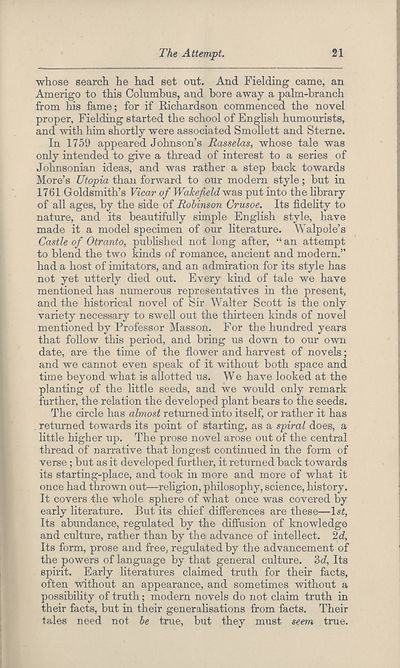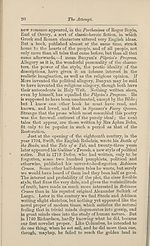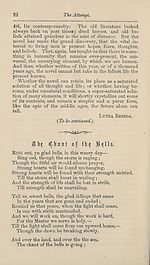Download files
Complete book:
Individual page:
Thumbnail gallery: Grid view | List view

I'he Attempt. 21
whose search he had set out. And Fielding came, an
Amerigo to this Columbus, and bore away a palm-branch
from his fame; for if Richardson commenced the novel
proper. Fielding started the school of English humourists,
and with him shortly were associated Smollett and Sterne.
In 1759 appeared Johnson's Rasselas, whose tale was
only intended to give a thread of interest to a series of
Johnsonian ideas, and was rather a step back towards
More's Utopia than forward to our modern style ; but in
1761 Goldsmith's Vicar of Wakefieldwas put into the library
of all ages, by the side of Robinson Crusoe. Its fidelity to
nature, and its beautifully simple English style, have
made it a model specimen of our literature. Walpole's
Castle of Otranto, pubhshed not long after, " an attempt
to blend the two kinds of romance, ancient and modern."
had a host of imitators, and an admiration for its style has
not yet utterly died out. Every kind of tale we have
mentioned has numerous representatives in the present,
and the historical novel of Sir Walter Scott is the only
variety necessary to swell out the thirteen kinds of novel
mentioned by Professor Masson. For the hundred years
that follow this period, and bring us down to our own
date, are the time of the flower and harvest of novels;
and we cannot even speak of it without both space and
time beyond what is allotted us. We have looked at the
planting of the little seeds, and we would only remark
further, the relation the developed plant bears to the seeds.
The circle has almost returned into itself, or rather it has
. returned towards its point of starting, as a spiral does, a
little higher up. The prose novel arose out of the central
thread of narrative that longest continued in the form of
verse ; but as it developed further, it returned back towards
its starting-place, and took in more and more of what it
once had thrown out—religion, philosophy, science, history.
It covers the whole sphere of what once was covered by
early literature. But its chief differences are these—\st.
Its abundance, regulated by the diffusion of knowledge
and cultiu'e, rather than by the advance of intellect. 2d,
Its form, prose and free, regulated by the advancement of
the powers of language by that general culture. 3c?, Its
spirit. Early literatures claimed truth for their facts,
often without an appearance, and sometimes without a
possibility of truth; modern novels do not claim truth in
their facts, but in their generalisations from facts. Their
tales need not be true, but they must seem true.
whose search he had set out. And Fielding came, an
Amerigo to this Columbus, and bore away a palm-branch
from his fame; for if Richardson commenced the novel
proper. Fielding started the school of English humourists,
and with him shortly were associated Smollett and Sterne.
In 1759 appeared Johnson's Rasselas, whose tale was
only intended to give a thread of interest to a series of
Johnsonian ideas, and was rather a step back towards
More's Utopia than forward to our modern style ; but in
1761 Goldsmith's Vicar of Wakefieldwas put into the library
of all ages, by the side of Robinson Crusoe. Its fidelity to
nature, and its beautifully simple English style, have
made it a model specimen of our literature. Walpole's
Castle of Otranto, pubhshed not long after, " an attempt
to blend the two kinds of romance, ancient and modern."
had a host of imitators, and an admiration for its style has
not yet utterly died out. Every kind of tale we have
mentioned has numerous representatives in the present,
and the historical novel of Sir Walter Scott is the only
variety necessary to swell out the thirteen kinds of novel
mentioned by Professor Masson. For the hundred years
that follow this period, and bring us down to our own
date, are the time of the flower and harvest of novels;
and we cannot even speak of it without both space and
time beyond what is allotted us. We have looked at the
planting of the little seeds, and we would only remark
further, the relation the developed plant bears to the seeds.
The circle has almost returned into itself, or rather it has
. returned towards its point of starting, as a spiral does, a
little higher up. The prose novel arose out of the central
thread of narrative that longest continued in the form of
verse ; but as it developed further, it returned back towards
its starting-place, and took in more and more of what it
once had thrown out—religion, philosophy, science, history.
It covers the whole sphere of what once was covered by
early literature. But its chief differences are these—\st.
Its abundance, regulated by the diffusion of knowledge
and cultiu'e, rather than by the advance of intellect. 2d,
Its form, prose and free, regulated by the advancement of
the powers of language by that general culture. 3c?, Its
spirit. Early literatures claimed truth for their facts,
often without an appearance, and sometimes without a
possibility of truth; modern novels do not claim truth in
their facts, but in their generalisations from facts. Their
tales need not be true, but they must seem true.
Set display mode to: Large image | Transcription
Images and transcriptions on this page, including medium image downloads, may be used under the Creative Commons Attribution 4.0 International Licence unless otherwise stated. ![]()
| Ladies' Edinburgh Debating Society publications > Attempt > Volume 10 > (31) Page 21 |
|---|
| Permanent URL | https://digital.nls.uk/104310218 |
|---|
| Attribution and copyright: |
|
|---|

